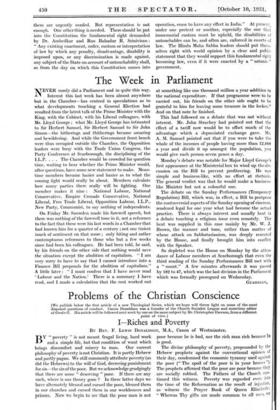The Week in Parliament 'NEVER surely did a Parliament end
in quite this way.
Interest this last week has been almost anywhere but in the Chamber—has centred in speculations as to what developments touching a General Election had resulted from the latest talk of the Prime Minister with the King, with the Cabinet, with his Liberal colleagues, with Mr. Lloyd George ; what Mr. Lloyd George has intimated to Sir Herbert Samuel, Sir Herbert Samuel to Sir John Simon—the hitherings and thitherings became amazing and bewildering. And while the Government front bench were thus occupied outside the Chamber, the Opposition leaders were busy with the Trade Union Congress, the Party Conference at Scarborough, the disciplining of the I . L . P The Chamber would be crowded for question time, waiting to hear whether the Prime Minister would, after questions, have some new statement to make. Mean- time members became hazier and hazier as to what the coming fight would really be about. Members calculate how many parties there really will be fighting. One member makes it nine : National Labour, National Conservative, Empire Crusade Conservative, National Liberal, Free Trade Liberal, Opposition Labour, I.L.P., New Party, Communist, to say nothing of independents.
On Friday Mr. Snowden made his farewell speech, but there was nothing of the farewell tone in it, not a reference to the fact that these were his last words in a Chamber that had known him for a quarter of a century ; not one tiniest touch of sentiment on that score ; only biting and rather contemptuous references to those who but a few weeks since had been his colleagues. He had been told, he said, by his friends on the other side that nothing would save the situation except the abolition of capitalism. " I am very sorry to have to say that I cannot introduce into a Finance Bill proposals for the abolition of capitalism." A little later : " I must confess that I have never read Labour and the Nation.' There is a summary I have read, and I made a calculation that the cost worked out at something like one thousand million a year addition to the national expenditure. If that programme were to be earned out, his friends on the other side ought to be grateful to him for leaving some treasure in the locker." And on that note he finished.
This had followed on a debate that was not without interest. Mr. John Strachey had pointed out that the effect of a tariff now would be to offset much of the advantage which a depreciated exchange gave. Mr. A. M. Samuel pointed out that if you were to take the whole of the incomes of people having more than £2,000 a year and divide it up amongst the population, you would give each person seven pence a day.
Monday's debate was notable for Major Lloyd George's first appearance at the Ministerial box to wind up the dis- cussion on the Bill to prevent profiteering. He was simple and business-like, with no effort at rhetoric. The general verdict was that he would make a business- like Minister but not a colourful one.
The debate on the Sunday Performances (Temporary Regulation) Bill, which was, in effect, a Bill to postpone the controversial aspects of the Sunday opening of cinemas, rendered legal for one year what had become the actual practice. There is always interest and usually heat in a- debate touching a religious issue even remotely. The heat was supplied in this case mainly by Mr. W. J. Brown, the manner and tone, rather than matter of whose attack on Sabbatarianism, was deeply resented by the House, and finally brought him into conflict with the Speaker.
So depleted was the House on Monday by the atten• dance of Labour members at Scarborough that even the third reading of the Sunday Performances Bill met with a " count." A few minutes afterwards it was passed by 182 to 47, which was the last division in the Parliament which was formally prorogued on Wednesday.
GUARDIAN


















































 Previous page
Previous page